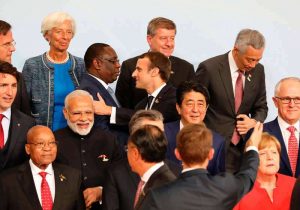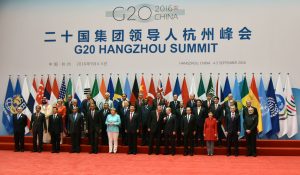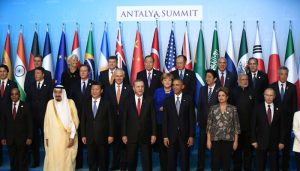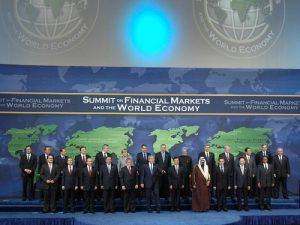
The world may obsess about the upcoming meeting between Donald Trump-Xi Jinping meeting in Buenos Aires, but Prime Minister Narendra Modi is determined not to let the trade spat hijack the G20 agenda as he prepares to showcase the India growth story on the global stage and chant the tune of a reformed multilateralism amid a rising crescendo of protectionism.

Mr Modi will be in the Argentine capital for barely 48 hours starting November 29, but he has a packed itinerary that includes meetings with the leaders of more than half a dozen countries, including China, France, Germany and Jamaica, among others. There is a possibility that if schedules match, PM Modi will have a bilateral meeting with US President Donald Trump as well.
From Fortaleza to Buenos Aires: Song of India

The G20 summit is his last multilateral outing on the global stage before he faces national elections in the summer of 2019, and hence one can expect Mr Modi to wax eloquent at the G20 summit on a host of interlinked themes, which have marked his intense diplomatic outreach, cutting across continents, in the last four and a half years. In a way, the visit to Argentina completes a circle as he made his debut on the global stage in South America at the BRICS summit in Fortaleza, Brazil in July 2014.

From Fortaleza to Buenos Aires, it’s been an exhilarating diplomatic journey for Mr Modi tirelessly showcased the unfolding story of India’s transformation on the global stage and proactively sought international support for flagship schemes of national resurgence, including Make in India, Skill India, Digital India, Smart Cities, Clean India & Clean Ganga and Start-up India. In Buenos Aires, too, Mr Modi is expected to draw the world’s attention anew to core issues of financial inclusion, inclusive global growth and sustainable development.
Putting People First
From the preview provided by Foreign Secretary Vijay Gokhale, Mr Modi’s interventions at three sessions of the G20 summit will largely revolve around his government’s pioneering efforts in promoting financial inclusion through schemes like Jan Dhan Yojana, Aadhar and Mudra Yojana to reach out to the lowest rungs of the society.
In the middle of a high-stakes electoral battle shaping up back home, Mr Modi’s G20 speech in Buenos Aires is set to have the flavour of an election speech, and his message will be aimed as much at the domestic audience as the international community. Critics may accuse him of unabashed exhibitionism, but the issues of financial inclusion, the future of work and sustainable development are also inextricably intertwined with the G20 agenda. In fact, Mr Modi’s pet subjects dovetail well with the master-theme of the G20 summit in Buenos Aires: ‘Building Consensus for a Fair and Sustainable Development,’ and the three thematic sessions on “Putting People First,” “Building Consensus” and “Embracing Opportunities.” Mr Modi is set to make a lead intervention in the first session, and will also make subsidiary interventions in the other two sessions.
Reformed Multilateralism

Outlining India’s core interests at the G20 summit, Mr Gokhale said PM Modi is expected to highlight risks posed by increasing oil price volatility which has adversely impacted emerging economies like India and espouse a rules-based international trading order. “It is something which affects the lives of people and it is incumbent that the leaders of the 20 largest economies reflect upon both the price of oil and its availability in the market,” he said.
PM Modi is expected to amplify his vision of reformed multilateralism, which he spoke about first at the BRICS summit in Johannesburg in July this year. “Emerging economies, which played a major role in revitalizing the growth in the global economy pursuant to the financial crisis are today facing unprecedented economic and technological challenges. I will highlight the need for reformed multilateralism which reflects the contemporary realities and can effectively strengthen collective action for global good. There is also a serious need to strengthen international cooperation and enhance coordinated action against fugitive economic offenders and financing of terrorism,” said PM Modi in a statement before he left for Buenos Aires on November 28. Explaining India’s view of multilateralism, Mr Gokhale said: “We cannot replace a rules-based, agreed multilateral order with unilateral actions but we can certainly look at reform of systems in the light of the new situation,” said Mr Gokhale, while alluding to PM Modi’s speech at the BRICS summit in Johannesburg.
With the G20 summit taking barely days after the 10th anniversary of the 26/11 Mumbai carnage, one can also expect Mr Modi to build on his 11-point action plan at the Hamburg summit and rally the world community to intensify pressure on Pakistan to bring the perpetrators of 26/11 to justice and to stop cross-border terror forthwith.
The Road Ahead

While the Modi-Xi meeting will hog the headlines and the world will be eagerly watching whether the world’s number 1 and 2 economies strike a deal to defuse tensions, India is determined that the G20 agenda is not hijacked by one issue.
“Our view is that G20 goes beyond a single issue and must actually cover the entire gamut of economic issues, including agriculture sector reforms, transition in energy, the challenges that climate change poses, the healthcare problem that world faces and so on. I think this is the frame of mind or terms of reference on which certainly the delegation from India led by Prime Minister will be participating.”
Looking ahead, the Buenos Aires summit should be a time for retrospection, introspection and mapping the way ahead for the G20 grouping of the world’s most powerful economies. The last decade has produced voluminous all-encompassing joint communiques, with the leaders enunciating their collective position on an entire gamut of cross-cutting issues. But it’s time to move beyond grandiose and verbose declarations, and walk the talk to stay relevant and effective amid profound geopolitical and geo-economic shifts in the world.

(Manish Chand is the CEO-Editor-in-Chief of India Writes Network and India and World magazine. He has been tracking the G20 grouping since its birth in 2008 and has written extensively on the G20 summits. He has authored and edited many books, including “Journeys Across Continents: A New India on the Global Stage,” a book on PM Modi’s diplomatic outreach.)
Author Profile

- Manish Chand is Founder and Editor-in-Chief of India Writes Network (www.indiawrites.org) and India and World, a pioneering magazine focused on international affairs. He is CEO, Centre for Global India Insights, an India-based think tank focused on global affairs.
Latest entries
 India and the WorldFebruary 17, 2026South-by-South: Focus on people-centric solutions at India AI summit
India and the WorldFebruary 17, 2026South-by-South: Focus on people-centric solutions at India AI summit India and the WorldFebruary 7, 2026Modi hails interim India-US trade deal, Goyal says no concessions made on agriculture
India and the WorldFebruary 7, 2026Modi hails interim India-US trade deal, Goyal says no concessions made on agriculture India and the WorldFebruary 2, 2026Trump announces trade deal with India, Modi ‘delighted’
India and the WorldFebruary 2, 2026Trump announces trade deal with India, Modi ‘delighted’ India and the WorldJanuary 31, 2026Palestinian minister bats for mediatory role for India in ending Gaza conflict
India and the WorldJanuary 31, 2026Palestinian minister bats for mediatory role for India in ending Gaza conflict







